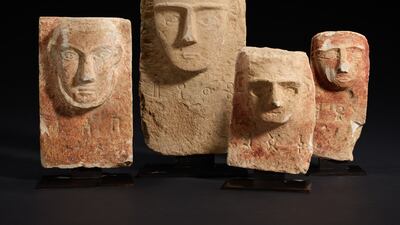Britain's V&A museum has agreed to look after and display four ancient carved funeral stones from Yemen which were discovered in a London interior design shop by an archaeology enthusiast.
The funerary stelae – which are believed to date from the second half of the first millennium BC – were recovered after enthusiast alerted the Metropolitan Police's Art and Antiques Unit, which investigates art theft, illegal trafficking and fraud.
The museum has agreed to be the items' custodian until they can be safely returned to Yemen.
The police investigation established the objects are from Yemen, and originate from a necropoli – many of which have been subjected to looting in recent years.
On Tuesday, the director of the V&A, Dr Tristram Hunt, and Dr Yassin Saeed Noman Ahmed, Ambassador for the Republic of Yemen based in the UK, signed a historic agreement for the stones' protection.
It will see the V&A care for the stelae on a temporary basis, until Yemen deems it is safe to return the objects.
A team at the museum will conduct research into the stones before they are showcased at a Culture in Crisis display at the V&A's East Storehouse, at London's Queen Elizabeth Olympic Park, which will open in 2025.
“We are delighted to collaborate with the Republic of Yemen’s Embassy in the UK and The Metropolitan Police’s Art and Antiques Unit to store, research and display these four incredible ancient carved funerary stelae,” Dr Hunt said.
“This is a historic agreement that will give the public the chance to appreciate these exceptional examples of Yemeni culture and creativity, before the objects are repatriated, and shine a light on how the V&A's Culture in Crisis programme helps curtail the illegal trade of looted objects and the preservation of cultural heritage worldwide.”
The agreement is unique, in that in most similar cases, objects might be stored by museums for only a short time before being transferred to their country of origin.
Police hope display will highlight issue of looting artefacts
Commander Stephen Clayman of Central Specialist Crime at the Metropolitan Police, said he hoped the recovery of the items would help encourage people to establish an artefact’s provenance before purchase to avoid fuelling the looting of treasures.
“The Art and Antiques Unit seized these four stelae from a shop in London following information received from a concerned member of the public,” he said.
“The police investigation established that they are ancient archaeological artefacts from Yemen, and came from necropoli that have been subjected to looting in recent years.
“When the seller was given this information they made the generous decision to disclaim them, and asked for them to be returned to Yemen.
“I am pleased that we have been able to achieve this today. I hope that when these pieces go on display at V&A East Storehouse, they may encourage people to consider antiquities from a legal perspective as well as an aesthetic one.
“By establishing an artefact’s provenance before purchase they may avoid inadvertently fuelling the demand for stolen cultural goods. The Art and Antiques Unit would like to thank everyone who contributed to the investigation and this positive outcome.”
The works, which are of the type on The International Council of Museum’s Emergency Red List of Cultural Objects at Risk, will be exhibited to the public as part of a programme dedicated to the preservation of cultural heritage worldwide.
Charles Harper, UK Chargé d'affaires and Deputy Ambassador to Yemen, said the objects will play an important role in rebuilding Yemen in the future.
“Arts and culture can play an important role in rebuilding a society from conflict and this agreement is a fantastic way to ensure Yemeni culture remains in Yemeni care,” he said.
“The war has taken a devastating toll on Yemenis. The UK will continue to support UN-led efforts to bring about a sustainable and inclusive peace in Yemen.”
The display at V&A East Storehouse will tell the story of the unique objects, alongside an overview of the work the museum does promoting and protecting cultural heritage around the world.
Established in 2015, the V&A's Culture in Crisis Programme brings together those protecting cultural heritage, and works closely to support the Metropolitan Police, as well as law enforcement around the world, to help prevent the illicit trade of cultural artefacts.
Britain has come under pressure in recent years to return historic objects to their countries of origin, including the return of the Benin Bronzes.
Last month the US signed a historic agreement with Mohammed Al Hadhrami, Yemen’s ambassador to the US, to establish a cultural property pact that will allow Washington to enforce import restrictions on archaeological and cultural artefacts from Yemen to curb looting.


